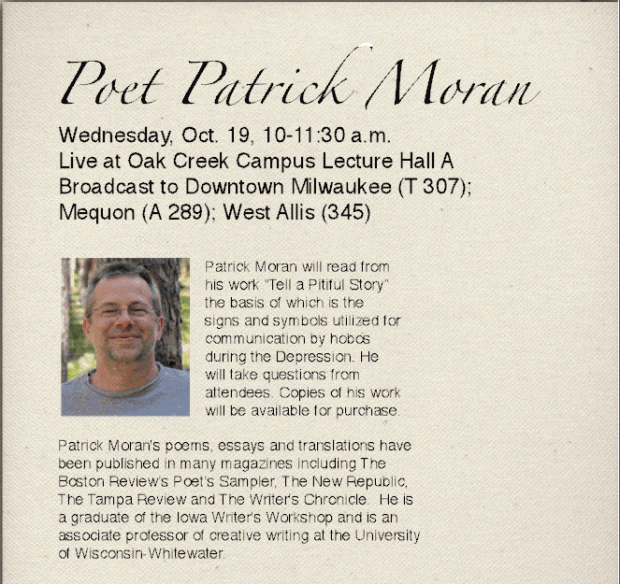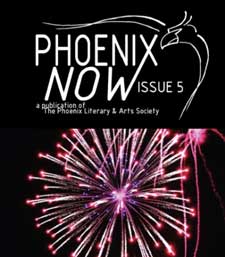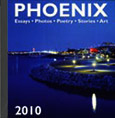Archive for the ‘Interviews and Guests’ Category
MATC Phoenix Faculty Jonathan Cardew Interview!
MATC Phoenix Faculty Member Jonathan Cardew Published and Interviewed!
Staunch MATC Phoenix supporter Jonathan Cardew was recently featured in the Atticus Review! Not only is Jonathan a MATC English Instructor, he has given his personal time and effort to drive the MATC Phoenix forward and currently acts as a voluntary faculty reader for the magazine.
Read more for insight into Jonathan Cardew’s writing thought process and for a sample from his creative works.
He even plugs our very own MATC Phoenix in the interview!
Thank you, Jonathan, and congrats!
Voices of the Phoenix–Episode 1
Voices of the Phoenix, Audio Podcast of Episode 1
This is a monthly podcast created by the Phoenix Literary and Arts Society (PLAS)– a Milwaukee Area Technical College’s student organization.
Each month we feature a creative contributor from MATC and discuss their work as it pertains to real life.
Please click on the following link to download the Audio Podcast and to view the poem which was discussed in this podcast. Note: You will need to have “QuickTime Player” installed to download the podcast.
Click HERE.
Phoenix Now, Issue 3: Reawakening
*NEW* OPEN MIC EVENT, Tuesday, May 1st at the West Campus from 1-3:30 p.m.
A Symbol of Perseverance: Excerpt from an Interview with Patrick Moran*
By: Jason M. Kolodzyk
Patrick Moran, author of the book of poems titled tell a pitiful story, spoke with me about his past, present, and future in a telephone interview on Friday October 7th, 2011. What follows is an excerpt from our conversation.Â
The entire interview will be published in the 2012 printed edition of MATC’s The Phoenix: Literary and Arts Magazine.
Sample hobo marks
 Interview
Jason M. Kolodzyk: Your newest book of poetry, tell a pitiful story, is based on the lives of American hobos from the Depression era. As your book states, they “communicated through a basic system of marks—a code through which they gave information and warnings†(p. 11). How did you create the idea behind writing poems based on American hobo “marks�
Patrick Moran: I knew there was something out there, something that uses visual elements and creates poems that respond to them. I made a couple of attempts to do this but they were utter failures. They were terrible, awful. Then I was up in Green Bay at the National Railroad museum with my family, and I saw hobo images there, only about five or six of them. I was struck by how simple and crude they were, yet very interesting visually, and then I found out what the symbols meant and I was just blown away. They were so distinct, so compelling: “tell a pitiful story,†“kind woman lives here, “these people are rich,† “good place for a handoutâ€â€”I was struck by these meanings. I then did research and found that there were 45 standard hobo symbols that were collected by a man named Henry Dreyfuss who wrote a book called the Symbol Sourcebook: The Authoritative Guide to International Graphic Symbols. I thought, ‘This is a book of poems waiting to be written.’ I had never seen it before and I felt the meanings of the symbols were so compelling. Cumulatively, the symbols set forth this very difficult life and a neurosis of what these, mostly men, would go through as they traveled around. There was always an implied sense of danger. I set myself the task of trying to write the poems.
In addition to the translated meanings from the Symbol Sourcebook, there were different stories my father would talk about growing up in Green Bay and having hobos stop by his house. My grandmother, who is Irish and very suspicious, would never turn them away. She would make them a fried egg sandwich and then make them go collect wood in the backyard. She never wanted the kids to talk to them because she felt they might steal her children away or say to them, “You should ride the rails†or “You should escape this life.†As I was writing the poems, I remember in my mind hearing clearly the story by John Steinbeck called the “The Chrysanthemums,†which has a hobo in it, and then Harry McClintock’s song “Big Rock Candy Mountain,†which is a fascinating portrait of hobo life. So all of those things were coming together in my mind.
JMK: You were the winner of the 2011 editors’ prize in poetry given by the publisher Augury Books. What does this award mean to you?
PM: Oh, that’s a good question. I probably entered 400 contests similar to the one I entered this year, and sometimes I would get a little slip of paper saying that someone else won, and sometimes I would get a letter saying that I was a finalist. I just wouldn’t let myself get discouraged about it. I just told myself I would have to keep trying and working at this because that is the only way I am going to win one of those coveted prizes. When I got the email from Augury Press, who is going to publish my up-coming third book, that I had won, in a way I was pleasantly surprised and happy. At the same time what hit me was that this was the first time that I was the one to get the prize and to see the list of other people who were runners-up. I could feel sympathy for those poets, and knew what it must be like for them to wonder, ‘What did he/she do that prevented me from winning?’ Other than doing a short dance in the kitchen after I found out, it felt good yet I was empathetic towards the others who ‘almost’ won.
JMK: It appears that much of your newest publication, tell a pitiful story, is written in free verse. How do you determine the form your poems will take?
PM: Right. One thing that was guiding the poems was that I wanted to write them all in the second person. If you look, there is only one poem that doesn’t use the second person, in other words, such as “you would see this,†or, “you should be afraid.â€Â The free verse element that comes into it was relying on the second person, then I also wanted them to be very clipped lines to not so much reflect the rhythm you have, say, in iambic pentameter, but to reflect a stream of consciousness flash of thoughts that would surface quickly when a hobo might see a particular image, a ‘hobo mark,’ in their travels. I do write formal poems, but this felt like a clipped language based on the immediacy of it, so free verse was a very good venue. Three early drafts of the book were much longer and more wordy, and as I worked with different poets, namely Heather McHugh and Stephen Dunn, I could see that I could cut language out, conjunctions, definite articles, and keep tearing the language down to its absolute. Those things determined the free verse appearance which you see on the pages.
JMK: What advice can you give to an aspiring poet or writer?
PM: Short story writer, novelist, playwright, the kind of advice other people gave me: Read, read, read! Whether it is Chekov, or Lorine Niedecker, or articles on psychology, anything. The more you read, the more you acquaint yourself with poetry and drama, or anything else, you become more and more enriched with language. The other thing is to not be discouraged. There was a very long period in my career as a writer, where I might publish, if I was lucky, maybe one or two poems a year. I encourage writers to not be discouraged, as it takes persistence and dedication. Because writers create in isolation so often, there is always the possibility that they will become discouraged because they are by themselves and this can heighten the feeling of isolation. Stay with what you like and develop it from there.
* With the interviewee’s permission, some elements of the interview excerpt were altered or omitted for clarity
Poet Patrick Moran Visits MATC
MATC’s Grassroots Series Welcomes Poet Patrick Moran to Oak Creek Campus Oct. 19
OAK CREEK – The Milwaukee Area Technical College Grassroots Series will host poet Patrick Moran on Wednesday, Oct. 19, from 10-11:30 a.m. The event will be held in Lecture Hall A on MATC’s Oak Creek Campus, 6665 S. Howell Ave. The presentation also will be broadcast to MATC’s campuses – Downtown Milwaukee (Room T307); Mequon (Room A 289); and West Allis (Room 345).
Moran will read from his work “Tell a Pitiful Story†the basis of which is the signs and symbols utilized for communication by hobos during the Depression. He will take questions from attendees. Copies of his work will be available for purchase.
Patrick Moran’s poems, essays and translations have been published in many magazines including The Boston Review’s Poet’s Sampler, The New Republic, The Tampa Review and The Writer’s Chronicle. He is a graduate of the Iowa Writer’s Workshop and is an associate professor of creative writing at the University of Wisconsin-Whitewater.
Grassroots Series events are intended to connect issues studied in liberal arts & sciences classrooms with our everyday lives.









